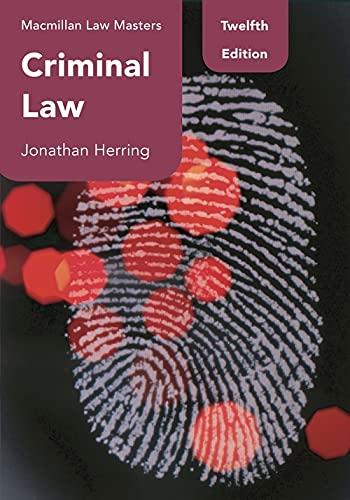Question
1. True or False Under the doctrine of comparative negligence, one can be sued for their negligence and breach of duty of due care 2.
1. True or False
Under the doctrine of comparative negligence, one can be sued for their negligence and breach of duty of due care
2. Statute of Limitations
applies to civil and criminal claims, except murder |
| is a way to achieve finality of claims |
| is an affirmative defense |
| all of these options are true statements and a correct response |
3. True or False
Civil litigation against police officers and police agencies is seen as a legitimate way to control the risk of abuse of police power or an attempt to limit misuse of police power by law enforcement agencies
4. In a civil trial against a police agency in which the plaintiff is seeking monetary damages, the plaintiff must prove their case by:
Beyond a Reasonable Doubt |
| Preponderance of the Evidence |
| Clear and Convincing Evidence |
| Beyond a Shadow of a Doubt |
. Which of the following statements are TRUE
The same actions by an individual cannot be the basis of a criminal charge and a civil tort charge |
| The same actions by an individual can be the basis of a criminal charge and a civil tort charge |
| All torts are intentional because the actor meant to do them |
| None of the above are true |
Step by Step Solution
There are 3 Steps involved in it
Step: 1

Get Instant Access to Expert-Tailored Solutions
See step-by-step solutions with expert insights and AI powered tools for academic success
Step: 2

Step: 3

Ace Your Homework with AI
Get the answers you need in no time with our AI-driven, step-by-step assistance
Get Started


